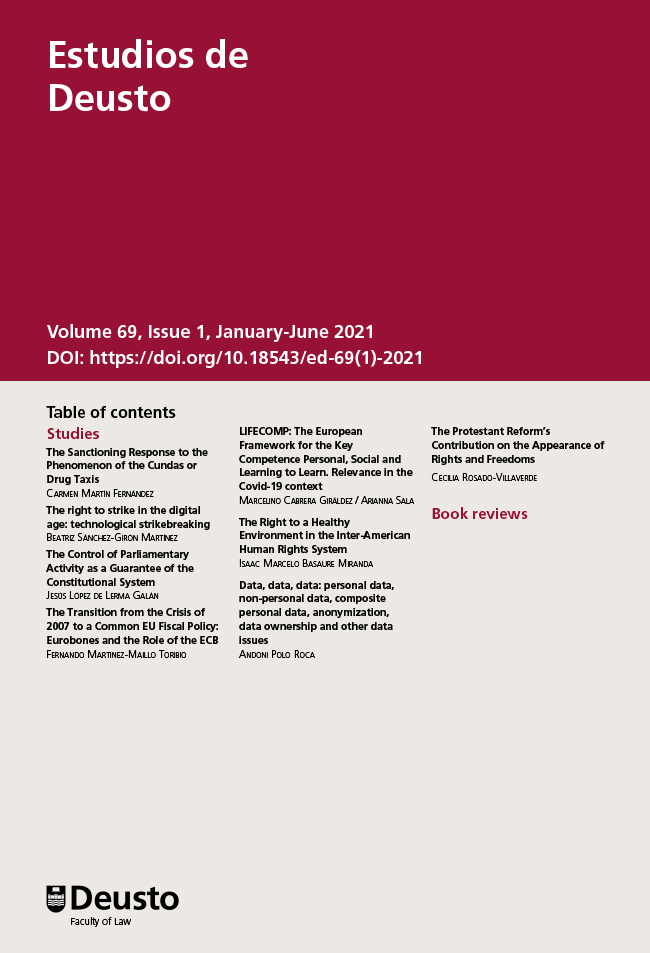Data, data, data: Personal data, non-personal data, composite personal data, anonymization, data ownership and other data issues
Abstract
Data protection is an area in constant growth, due to new technologies and the dangers they pose to our privacy. At the core of data protection, we have just that: «personal data». But what is a personal data? The answer is found in the GDPR, but the legal definition may not reach all the data that it should. To this is added the doctrine of the CJEU, or the doctrine of the ECHR in relation to «data relating to private and family life». Along with this, we will also see the «non-personal data» that has also been defined by EU law, and that is outside the application of the GDPR, but do they have any protection? In this area, so-called metadata takes relevance, which is non-personal data per se, but which can pose a threat to privacy. For this reason, the CJEU made some highly relevant pronouncements regarding these «non-personal data» (technically), which have resulted in what can be called the theory of «composite personal data» or «profile theory», a data which is both personal and non-personal (hybrid); this coupled with the combination of data and the aggregation of data. In all this, we must also bear in mind the pseudonymization and anonymization, but especially the possibility of re-identifying a person. And finally, it is necessary to address the analysis regarding the ownership of personal data (data ownership) and its commercialization, answering two questions: whose data is it? And are our data objects of commerce?
Received: 11.01.2021
Accepted: 18.06.2021
Downloads
Last update: 08/02/2022
The authors, by submitting their manuscripts to the Estudios Deusto. Revista de Derecho Público, accept the conditions listed below on copyright and undertake to comply with them.
- Authorship: The author must be the sole creator of the work or legally acting on behalf of and with the full agreement of all the authors.
- Copyright, liability and Ethical Guidelines:
- Authors warrant that their manuscript is original; has not been previously copyrighted or published in any form; is not under consideration for publication elsewhere; its submission and publication do not violate the Ethical Guidelines of Estudios Deusto. Revista de Derecho Público and any codes (of conduct), laws or any rights of any third party; and no publication payment by the Publisher (University of Deusto) is required.
- Authors grant to the Publisher the worldwide, sub-licensable, and royalty-free right to exploit the manuscript in all forms and media of expression, now known or developed in the future, for educational and scholarly purposes.
- Authors retain the right to present, display, distribute, develop, and republish their manuscript to progress their scientific career provided the original publication source (Estudios Deusto. Revista de Derecho Público) is properly acknowledged and in a way that does not suggest the Publisher endorses them or their use of the work.
- Authors warrant that no permissions or licences of any kind have been granted or will be granted that might infringe the rights granted to the Publisher.
- Authors are solely liable for the consequences that may arise from third parties’ complaints about the submitted manuscript and its publication in Estudios de Deusto. Revista de Derecho Público.
- Users: Estudios de Deusto. Revista de Derecho Público is an Open Access publication. Its content is free for full and immediate access, reading, search, download, distribution and reuse in any medium or format only for non-commercial purposes and in compliance with any applicable copyright legislation, without prior permission from the Publisher or the author(s). In any case, proper acknowledgement of the original publication source must be made and any changes to the original work must be indicated clearly and in a manner that does not suggest the author’s and or Publisher’s endorsement whatsoever. Any other use of its content in any medium or format, now known or developed in the future, requires prior written permission of the copyright holder.



.jpg)
.jpg)
4.jpg)
4.jpg)
4.jpg)
.jpg)








